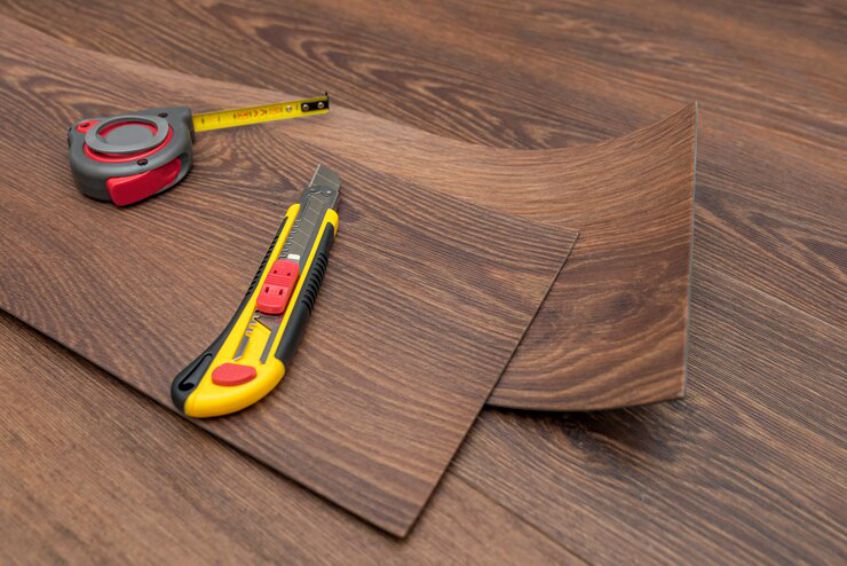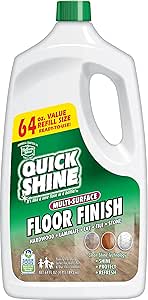Vinyl flooring provides a nice touch to the aesthetics of your house. It’s reasonably priced, visually beautiful, and has the feel of a timber floor. The popularity of vinyl flooring has always been high, but when it comes to cleaning and upkeep, most homeowners are at a loss.
Let’s get started with this post, which will provide you with knowledge on how to cope with a sticky floor.
Table of Contents
Why Are My Vinyl Floors Sticky?
Polyvinyl chloride, different materials, and glue are used to create vinyl flooring. It may get sticky if cleaning solutions and other chemicals are used excessively. Failure to follow a thorough cleaning technique and the use of haphazard cleaning agents may also cause vinyl flooring to become sticky.

The following are some of the reasons why my vinyl floor feels sticky:
Utilization of highly reactive chemicals:
Vinyl flooring constructed of polyvinyl materials may be water-resistant and have many exceptional qualities, but it loses its durability when exposed to highly reactive substances.
You will not use highly reactive acids, gasoline, or anything else unsafe on your vinyl floor, but simply using too much cleaning solution or an incorrect cleaning solution may cause your surface to become sticky.
Failure to follow adequate cleaning procedures:
Even if you use the perfect cleaning solution, if you don’t follow the proper cleaning technique, all of your efforts will be for nothing. You must thoroughly rinse the floor with lots of water. Don’t worry, vinyl flooring is water-resistant and will not get overly wet.
How can you clean and remove sticky vinyl floors?
For many homeowners, getting rid of sticky vinyl flooring would be a difficult chore. Sometimes it’s not repairable, and you’ll have to replace the old floor with a new one. However, before you get rid of your old vinyl floor, you might try these options.
Make use of rubbing alcohol.
You may wipe the floor using microfiber towels after spraying rubbing alcohol on it. Rubbing alcohol has a high drying capacity and can help remove any stubborn stains as well as deal with stickiness.
Make use of vinegar:
Vacuum the floor and remove all dust particles; otherwise, it will be an additional obstacle to overcome. Vinegar is acidic, so dilute it with water for safety.
When you’re through with your vinegar solution, soak a mop in it. After you’ve finished cleaning the floor, rinse it well with water.
Using a multi-surface cleaner or a vinyl floor cleaner
If you’ve already tried the first two options and haven’t seen any positive results, the only thing left to do is employ a good cleaning solution.
To remove the stickiness, use an all-purpose cleaning solution or a specialized cleaning solution. It’s important to remember that applying too much cleaning solution can harm the vinyl floor and make it stickier.
What can I do to keep my floor from becoming sticky?
Reduce the number of cleaning products you use:
When it comes to making the floor sticky, floor cleaning chemicals have a terrible reputation. Using too many cleaning solutions will undoubtedly ruin any floor. It could leave long-lasting stains or break down the polyvinyl layer, making the floor sticky.
Avoid applying excessive heat.
Nowadays, the majority of the flooring is made of polyvinyl, polycarbonate, and different types of adhesives. Heat, such as steam cleaning or waxing, will undoubtedly harm the outer and inner layers. As a result, avoid using any heat-generating equipment or cleaning processes.
Make a vinegar solution:
Using bleach or an excessive amount of chemical solution to clean your floor will almost certainly result in an unfavorable effect. It is okay to use a diluted vinegar solution to remove stains and stickiness.
What cleaners don’t leave a trace of their presence?
Vinegar
On your floor, you may use diluted vinegar. It is completely safe and will not leave any residue. 4 tablespoons of vinegar in a quarter gallon of water or 8 teaspoons of vinegar in a gallon of water. A mop may be used to wet and clean the floor.
Vinegar has an acidic character, so splattering it on the floor may result in an unpleasant outcome. To get rid of the odor, add a few drops of essential oil to the diluted vinegar solution.
Multi-purpose cleaner
A multi-purpose cleaner, often known as a multi-surface cleaner, is intended to clean a variety of surfaces. The manufacturer makes sure that it can be used on a wide range of surfaces.
Floor Cleaners with a Specialty
Nowadays, floor cleaners are available for your floor type. Laminate flooring, vinyl flooring, and other types of flooring are all susceptible to particular chemical components. As a result, the customized cleaning solution doesn’t use toxic chemicals while making a specific cleaning solution that works well.
Is it true that vinegar makes flooring sticky?
Because vinegar has an acidic nature, applying an acidic solution to particular flooring may be both annoying and damaging. However, if you dilute the vinegar with water, it makes an excellent cleaning solution. Vinegar is non-toxic, safe, effective, and inexpensive.
A very diluted vinegar solution will not cause you any problems. It will not leave a sticky residue on the floor.
What are the best cleaners for vinyl floors?
Polyvinyl chloride, different materials, and glue are used to create vinyl flooring. If the materials have certain chemical components, they may be able to react with those chemicals, and using them on the floor may not be good for them.
A diluted vinegar solution might be the best cleaning option for vinyl flooring. If you are not happy with these natural cleaners, you can always try a couple of vinyl floor cleaning options.
Using too many cleaning solutions may result in a sticky floor or irreparable damage.
I hope you grasp the essence of what I’m saying. The purpose of this article was to help you preserve your vinyl floor from a sticky situation. It may be difficult to replace a vinyl floor entirely, so appropriate cleaning and maintenance will increase its life.



